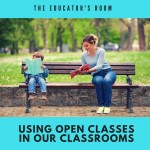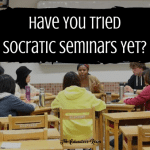The middle school or high school classroom library can be an important tool in making students life-long readers, but how to choose what goes into a classroom library for independent reading?
Providing the books that student want to read is different than pre-selecting books that students should read. Yes, educators believe that students should read selections from the literary canon, for example, those written by Shakespeare, Steinbeck, and the Brontë sisters. Students should read titles such as The Crucible, Tom Sawyer, and The Odyssey. These selections from the literary canon are often assigned in middle or high school classes, but these are not the only titles that should be in the classroom library.
Many students do not want to read these pieces of classic literature for pleasure. They want to read a title from the Diary of a Wimpy Kid or The Hunger Games series. The key difference between reading for pleasure and assigned reading is recognizing that students have similar guilty pleasures as adults in reading popular culture.
Students want to read titles such as the Dork Diaries; Angus, Thongs and Full-Frontal Snogging;I’d Tell You I Love You, But Then I’d Have to Kill You; Hatchet; or The Perks of Being a Wallflower. These are the titles they look for in their independent reading choices.
The titles students want to read can build vocabulary and fluency for the classic literature they are assigned in school. Reading books by John Green (Looking for Alaska, The Fault in our Stars), Anthony Horowitz (Point Blank, Scorpio) or Sarah Dessen (Dreamland, This Lullaby, The Truth About Forever) gives students the chance to practice reading for pleasure.
Reading for pleasure for today’s teen reader means wandering in some very dark worlds as students are particularly drawn bleak futures as depicted in the Divergent series (dystopian world) or Delirium series (dystopian world) or the Chaos Walking series (finding yourself in a dystopian world).
Student readers of fantasy, a genre sadly overlooked in most school offerings, cannot get enough of Rick Riordan’s retelling of Greek Mythology (The Lightning Thief, The Last Olympian) or his newer Egyptian series (The Red Pyramid).
When students are offered the titles they want to read, they can practice reading the way marathoners train for races or musicians rehearse for performances. Practicing reading in school with Silent Sustained Reading (SSR) or for homework improves their reading pace, their reading accuracy, and helps students develop a reading routine.
It does not matter if reading practice for pleasure includes some titles from the often maligned series from Captain Underpants (intermediate grades) or Twilight (high school grade). The elements of story (protagonist, antagonist, conflict, rising action, and resolution) are in each. Not to mention Stephanie Meyer’s borrowing passages from Wuthering Heights to accessorize her vampire-filled trilogy.
There is good reading practice in the R.L. Stine collections from Goosebumps to Fear Street, and there is good reading practice in Fruit Baskets (Manga) or Calvin and Hobbs comic books or in the Darwin Awards series.
Titles with movie tie-in such as the Star Wars series, World War Z, or the original Jurassic Park are always popular, and students check to see how accurately the film matches the text. YA Chick lit from Meg Cabot (The Princess Diaries) orAnn Brashares (The Sisterhood of the Traveling Pants) appeal to a particular female demographic while novels written by Nicholas Evans and Jodi Picoult can take that same group well into adulthood.
Allowing students the choices to read popular books for pleasure increases the amount of practice they do in and out of school to build up their reading stamina, for school and for life. The classroom library can be the resource for students to experiment with different genres: mystery, humor, romance, adventure, and drama.
Our students will be life-long readers if they develop the solid reading habits that come from reading for pleasure.





